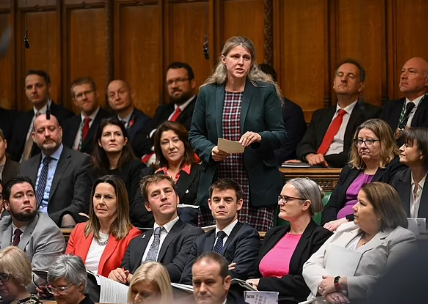DAVID GOODHART: Why Kemi Badenoch should put two-parent families at the heart of her drive to rebuild the shattered Tories_Nhy
When Labour was drawing up its 2015 election manifesto, the party’s then MP Jon Cruddas, a somewhat socially conservative politician, made many references to the importance of the family.
However, most of them were struck out of the final document.
These days, Labour is not so shy about using the word ‘family’. Education Secretary Bridget Phillipson has even talked about Labour being the party of the family.
Yet she is not inviting a debate about the importance of the two-parent family, nor proposing that the family should be properly recognised in the tax system or reducing the ‘couple penalty’ in the welfare system, as I will explain below.
In fact, Labour has not even, so far, reversed George Osborne‘s 2015 decision to reduce most welfare benefits to just two children.
That decision is a reminder of the UK’s depressing position as Europe’s leading nation for family breakdowns, with, not coincidentally, one of the least supportive family policy offers.
A few facts. More than half of children in England and Wales are now born to parents who are not married, compared with less than one third in the 1990s.
And just under half of all children (46 per cent) do not live with both biological parents at the age of 14, compared with about 20 per cent for those growing up in the 1980s when divorce rates first started to spike.

These days, Labour is not so shy about using the word ‘family’

More than half of children in England and Wales are now born to parents who are not married (stock image)
The proportion of households with dependent children led by a single parent is 24 per cent, whereas in the rest of Europe it averages 13 per cent, and it is much higher in poorer, post-industrial places such as Hartlepool (30 per cent) than Winchester (7 per cent).
Looked at over a six-year period, as many as 33 per cent of families with children have been a lone-parent family at some point.
The ‘revolving door’ template of short-lived relationships has been shown to be the most damaging of all to young children, with frequently disrupted attachments.
Single mothers – and, more rarely, fathers – can of course be excellent, loving parents. One emotionally focused parent is better than two detached or abusive ones.
Many children of single parents turn into happy, well-balanced adults, and sometimes high-achieving ones, such as Bridget Phillipson – not to mention Bill Clinton and Barack Obama.
It should also be noted that many people classified as coming from a single-parent household will have had loving substitute fathers or mothers.
But average outcomes matter. It is no disrespect to struggling single parents to highlight the fact that the lower level of family resources and parental time in single-parent households can have negative consequences.
Of the 30 per cent of all children living in poverty at age five, about three quarters are from single-parent families.
Half of single parents receive means-tested state support of some kind, compared with 12 per cent of cohabiters and 6 per cent of married parents.
Edward Davies, policy director at the Centre For Social Justice think-tank, cites poverty, housing and homelessness, educational attainment and criminal justice as areas hugely impacted by unstable family life.
He says: ‘The unintended consequence of instability in our family lives is a raft of social problems that we are now almost powerless to fix with traditional policy levers… social policy gains are actively reversed by the collapse in our home lives.’

Of the 30 per cent of all children living in poverty at age five, about three quarters are from single-parent families

Compared with 60 years ago, we are, on average, much richer, better educated and generally freer to choose our life course
Life is full of difficult balances and trade-offs, and these negative trends are intimately connected to positive ones – above all, the great extension of human freedom, especially for women, associated with the liberal reforms of the 1960s and 70s. These include everything from easier divorce to support for single parents.
Yet, as I argue in my new book, The Care Dilemma: Caring Enough In The Age Of Sex Equality, there has been an overshoot in the loosening of family life, and the undervaluing of the domestic realm more generally, that has caused things to slip out of kilter.
Compared with 60 years ago, we are, on average, much richer, better educated and generally freer to choose our life course.
But we are also more likely to live alone, to suffer from depression, are less likely to have children, or, if we are a child, much less likely to live in a stable family with both our biological parents.
There is plenty of evidence suggesting that the mental fragility epidemic among young people is inspired as much by family breakdown as it is by social media.
If there is a final taboo in British politics, it is the way a veil is drawn over these issues of family instability. The word ‘family’ is ubiquitous in political debate, and yet the married couple family is rendered semi-invisible in everyday dealings with the state, local authorities or the NHS.
The language of ‘husband and wife’, even ‘father and mother’, has largely disappeared from official documents.
Family policy in recent decades has focused on higher childcare subsidies – expanded last year by the then-Chancellor Jeremy Hunt by £4 billion – making it easier for both parents to spend more time at work.
More concerned with employment figures and tax receipts, Whitehall has scant interest in family instability, and the civil service elite is disproportionately made up of career-focused youngish people without family responsibilities.

If there is a final taboo in British politics, it is the way a veil is drawn over these issues of family instability
A serious family policy, however, would recognise the family properly in the tax system – like other rich countries do – and end the tax discrimination against couples.
For instance, a couple in which one is a full-time parent, while the other earns £60,000, will pay over £7,000 more in tax than if both adults earned £30,000 each.
The Government should also make it easier for one parent to stay at home, at least when children are pre-school, by paying the £9 billion in childcare subsidies direct to parents, and front-ending child benefit so that more can be provided in those stressful and expensive early years.
A liberal society should, of course, accommodate many different forms of family life, but that does not mean ignoring the facts about the importance of family structure and stability.
Yet for fear of stigmatising some families, our political class has looked away and decreed the subject beyond its reach.
No one suggests this is easy, yet the public is happy to have the conversation. If money was not an issue, the number of stay-at-home mothers of pre-school infants would roughly double to 40 per cent. And the measures above are popular, including among single parents, more than 60 per cent of whom say that children should be raised by two adults.
So it’s time we thought more seriously about what is happening behind closed doors. Could it even be a theme around which Kemi Badenoch could rebuild her shattered Conservative Party?


